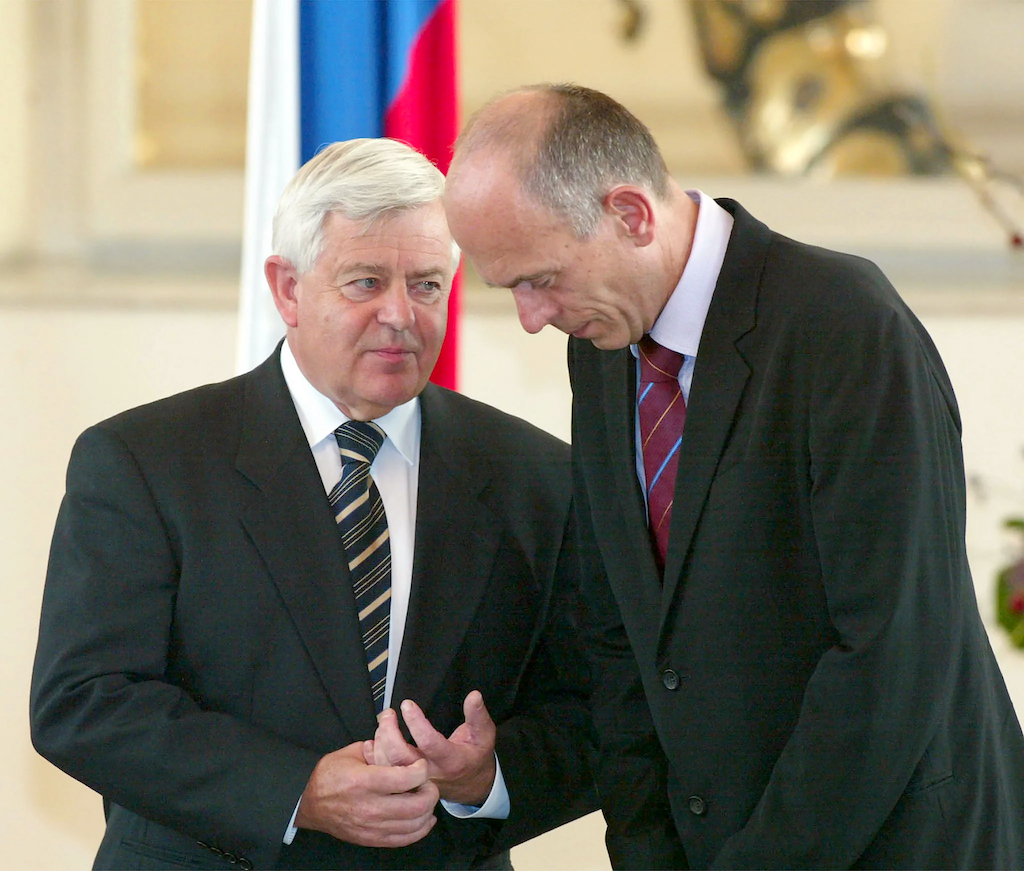By: Gašper Blažič
while the National Assembly was debating the dismissal of Speaker Urška Klakočar Zupančič, news broke during the discussion that a trio of MPs from the Freedom Movement had submitted a draft law to remove the secrecy of documents related to arms trading from 1991 to 1994.
Surprisingly, one of the proponents of the bill is none other than the Speaker of the National Assembly, Urška Klakočar Zupančič, who yesterday, during the debate, appeared to have “fallen ill” (a fact conveyed to the opposition by two other coalition MPs). However, she seemed to be in perfect health by the evening, as she was seen strolling outside the chamber but did not attend the debate itself.
UKZ wants to investigate arms trading
It is now apparent what occupied her attention during this time. Together with her colleagues Branko Zlobko and Martin Premk, she submitted a bill to lift the secrecy of documents regarding arms trading from 1991 to 1994. This move is puzzling, given that the subject has already been extensively covered in numerous books, with former journalist Blaž Zgaga and Matej Šurc playing central roles in documenting these events.
Klakočar Zupančič explained the rationale behind removing secrecy from the arms trading records: “It is time for citizens to form their own opinions on topics that continue to divide our nation, to have access to this material, and to finally put this story to rest once and for all.” However, she did not clarify which topics she believes are divisive – whether it is the arms trade or the independence project itself.
Martin Premk elaborated in a media statement that a similar bill was proposed in 2011 but was never passed. “That is why we decided to bring this matter to a conclusion,” he said. He pointed out that under the existing law on archival and documentary material, records older than 30 years are automatically transferred to the Archives of the Republic of Slovenia and made public. However, this new bill would extend public access to younger materials, such as National Assembly commission reports less than 30 years old.
Freedom Movement MP Branko Zlobko, a veteran of the Slovenian War of Independence, stated that he participated actively in preparations for Slovenia’s armed independence in 1990 and fought in the 1991 war. He emphasised: “After 33 years, it is finally time for the Slovenian public to learn the truth about the events surrounding the arms trade.” According to him, the public should be informed about arms procurement abroad from 1991 to 1994, as well as about “how much weaponry, equipment, and ammunition was left after the withdrawal of the Yugoslav People’s Army (YPA) from Slovenia, how much of it was sold, to whom, and how much money Slovenia received – or how much ended up in private pockets, and if so, who profited.” These statements may provoke reactions from those who have already written extensive books on the arms trade, as the Freedom Movement now behaves as though this was always a taboo topic.
The original sin is the disarmament of the Territorial Defence
It is hardly necessary to recount all the pompous statements made by the proposers of the law. However, Premk hints that certain parliamentary groups in the National Assembly might fear such a law. This is rather unusual, as previous investigations into the arms trade have already uncovered trails leading directly to Milan Kučan, who at the time was first the president of the Presidency of Slovenia and later the president of Slovenia.
The original sin, however, occurred in mid-May 1990 when Kučan was already leading the Presidency, while the new government (officially the Executive Council) had not yet been elected. At that time, the YPA began disarming Slovenia’s Territorial Defence – a meticulously planned action, seemingly motivated by the elections and Demos’ plans to implement the project of Slovenian independence. Consequently, Slovenia found itself without armaments at a critical moment, and only the covert Manoeuvre Structure of National Protection managed to establish a functional armed force.
Interestingly, in its legislative proposal, Svoboda aims to lift the confidentiality of arms trade dealings between July 18th, 1991 (when the Yugoslav Presidency decided to withdraw the YPA from Slovenia) and March 29th, 1994 (when Janez Janša was dismissed as defence minister following the Depala Vas incident). These dates, mentioned here as context, are not officially explained in the proposal. However, they are quite telling. The Depala Vas affair, essentially a conspiracy, is closely linked to illegal arms trading. When the Ministry of Defence under Janez Janša uncovered an arms trafficking network controlled by the deep state – without notifying the Ministry of Defence – it was concluded that Janša needed to be removed from politics. This led to the so-called Operation Ščuka, involving the operational actions of Drago Kos, Anton Peinkiher, and Radenko Radojčić. We have written extensively about this conspiracy HERE.
Are they trying to create a smokescreen?
It is unclear what Freedom Movement hopes to achieve with such a legislative proposal. Perhaps it seeks to enable the (re)production of new and old books to reopen nearly forgotten topics. This also reveals considerable anxiety within Freedom’s ranks. Another likely goal is to divert public attention from the increasingly angry reactions to soaring electricity bills. Notably, the coalition submitted this proposal after the office of President Nataša Pirc Musar accused the architects of the Slovenian state of committing bureaucratic genocide. But as stated earlier, the arms trade trails lead all the way back to Kučan.

